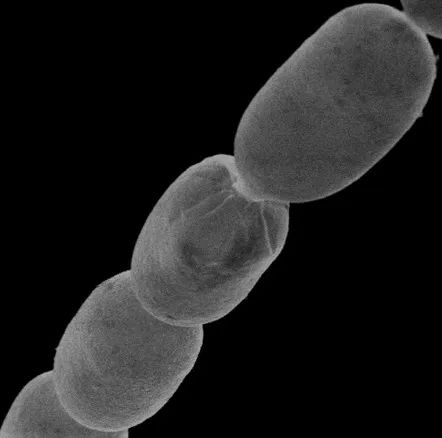If you want to take care of the "little pet" in your body, you have to take care of the "little pet" in your body. What you eat and what you want is related to them
Author:Medical newspaper Time:2022.07.13

Recently, a bacteria named Thiomargarita Magnifica have been on the entire network due to the large volume. This is a kind of silk creature lurking on the rotten leaves in the mangroves of the Caribbean Seaulop Island, which is 1cm in length. It is 50 times larger than any other known bacteria. It is by far the largest Single cell bacteria [1].

(Picture source: "Nature" magazine)
Netizens have said that bacteria have become "rough fungus", can they be called bacteria?
Duan Yunfeng, a Ph.D. in the Chinese Academy of Sciences and the research expert of Microbiology, said that the diameter of the bacteria is usually 0.5 to 5 microns, and the naked eye cannot be seen. Although Thiomargarita Magnifica is far beyond the average level of the bacterial world, according to its genetic classification, it still belongs to the category of bacterial. Although its application value needs to be developed, the discovery of this giant bacteria also reminds humans that there are still a large number of unknown bacteria waiting for human exploration.
In fact, since the birth of humans, the ancient microorganisms such as bacteria have been coexisting for millions of years with humans. Inside the human body that cannot be seen with the naked eye, microorganisms reach 1 million, 80%of which are located in the intestine.
Duan Yunfeng said that the microorganisms in the intestine are closely related to the physiological function and psychological state of human beings. If you want to be healthy and longevity, you have to take them as the "little pets" in the stomach to take good care of them.
What is the use of "small pets" in the body?
Intestinal microorganisms are human loyal "soul partners", and have been with you since you were born.
There are many types of them, including bacteria, viruses, fungi, etc. Among them, the most studied is bacteria. The intestinal tract has the most microorganisms, and the total weight may be as high as 1.5-2kg, which is equivalent to the weight of the brain.
Don't underestimate these tiny biological groups, their existence affects all aspects of our lives, including digestion breast milk, digestion fiber, regulating the immune system and nervous system, regulating emotions, maintaining intestinal health, preventing weight gain, reducing diabetes, heart disease and Cancer risk.

(Picture source: Qianku.com)
"What do you think every day, what you eat, and what you do, to be controlled by these microorganisms to a large extent." Duan Yunfeng introduced that modern research shows that there is a close nerve connection between the brain and the intestine, called the intestinal-brain axis. The intestinal microorganisms communicate with the brain through multiple ways and mediums such as autonomic nerves, intestinal nerves, immune systems, intestinal endocrine signals, and neurotransmitters.
In diet, intestinal microorganisms can send "signals" to a certain extent determine our food preferences. According to an article on "BIOESSAYS", the intestinal flora is in selective pressure to manipulate the host's eating behavior to increase its survivability. For example, Protonus like carbohydrates and monosaccharides. Mobilizes like certain fats, and bisidobacterium like dietary fiber. The changes in people's diet will also cause the number of species of the flora to change accordingly [2].
Emotionally, intestinal microorganisms can also regulate our mood through nerves. Recently, research on "Nature" found that bacteria in the intestine can convert the common amino acidic acid in the diet into 4-ethyl phenyl sulfate (4EPS), 4EPS can cross the blood brain barrier and reduce the formation of the brain to form the marrow marrow The nervous nerve of the sheath matures, leading to the emergence of anxiety. This helps to reveal the molecular mechanism related to intestinal flora and complex emotional behavior [3].
Many studies have also found that intestinal microorganisms are also related to life. A study of the residents of the world's longevity hometown in the world found that compared with young people and ordinary elderly people, the intestinal flora and microbial genes of centenarians are more diversity, which has enriched more history. Bacteria and Youth Bacteria [4].
Another study for 168 centenarians, ordinary elderly and young people in Dujiangyan City and Ya'an City, Sichuan Province, also obtained a similar point of view. There are several healthy flora, indicating that there is a connection between the intestinal flora and the aging of aging [5].

8.19 Chinese Physician's Day Special offer "Healthy China, You and Me-Caring for Life 'Salvation" around you "Multi-City Metro Linkly Public Welfare Tour Exhibition
How to get along with the intestinal microorganisms?
"Why do you live in harmony with microorganisms? Because we ca n’t live if we lack them. A large number of studies have proved that the survival of animals from leaving bacteria is not good at all, and health is seriously affected." Duan Yunfeng said Symbiosis, humans provide a living environment for microorganisms, and microorganisms also return to humans, provide the human body's essential nutrients, and improve the immunity of the human body.
When these intestinal microorganisms are unbalanced, they will affect human health in various ways, produce negative emotions, affect the effect of weight loss, and even the culprit of violence.
So, how should we take care of them? You can use the following methods.
Healthy diet: all grains, vegetables, beans and fresh fruits are rich in fiber, which can promote intestinal peristalsis and keep the intestine young. Consumption of fermented foods such as yogurt, sauerkraut, and tea can also increase the type of beneficial bacteria in the intestine.
Reasonable schedule: Insufficient sleep can affect systemic health, and it is impossible to allow the digestive system and intestinal microorganisms to get sufficient rest.
Moderate exercise: Regular aerobic exercise can strengthen the body, enhance physical resistance, and prevent intestinal flora disorders. Avoid using a large amount of antibiotics: Antibiotics may occur in the process of extinguishing bacteria, and the situation of "the enemy is indifferent" may occur. Therefore, try to avoid the use of large doses and long -term antibiotics, and to avoid the disorders of intestinal flora to the greatest extent.
Reference
[1] Levin, Petra Anne. "A Bacterium that is not a microbe." Science376.6600 (2022): 1379-1380.
[2] Alcock J, Maaley C C, Aktipis C A. Is Eating Behavior Manipulating by the GastroinTestinal Microbiota? Evolutionary Presses and Potential Mechanisms [j].
[3] Needham, B.D., Funabashi, M., Adame, M.D.et al.A gut-derived metabolite alters brain activity and anxiety behaviour in mice.Nature602,647–653 (2022). https://doi.org/10.1038 /S41586-022-04396-8
[4] Wu L, Zeng T, Zinellu a, et al. Across-sectional Study of Compositional and Functional Profiles of Gutmicrobiota in Sardinian Centenarians [J], 2019, 4 (4).
[5] Kong F, Hua Y, Bo Z, et al. Gutmicrobiota Signatures of Longevity [J]. Current Biology, 2016, 26 (18): R832-R833.
Capture: Guan Yanqing
Edit: Guan Yanqing
- END -
Strengthen the safety awareness of agricultural machinery, and carry out emergency disposal rescue drills in Lintong County

Dahe Daily · Yu Video Reporter Liu Guangchao Correspondent Wang Lisheng Jie GangO...
Shijiazhuang: Tianyuan Street Social Working Station Starts Girl Protection Project

On the morning of June 24th, the Social Work Station of Tianyuan Street, Xinhua Di...